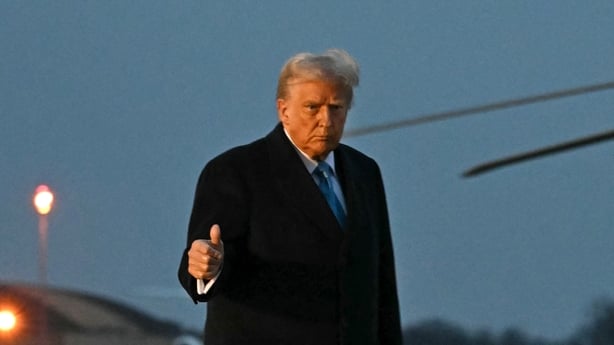US President Donald Trump has ordered 25% tariffs on Canadian and Mexican imports and 10% on goods from China starting on Tuesday, risking a new trade war that economists say could slow global growth and reignite inflation.
Mr Trump signed three separate executive orders on the tariffs after a long golf outing in Florida, vowing to keep the duties in place until what he described as the national emergency over the drug fentanyl and illegal immigration to the US ends.
Responding to concerns raised by oil refiners and Midwestern States, Mr Trump imposed only a 10% duty on energy products from Canada, with Mexican energy imports facing the full 25% tariff.
At nearly $100 billion in 2023, imports of crude oil accounted for roughly a quarter of all US imports from Canada, according to US Census Bureau data.
Automakers would be particularly hard hit, with new steep tariffs on vehicles built in Canada and Mexico burdening a vast regional supply chain where parts can cross borders several times before final assembly.
Read more:
Countries vow to retaliate against Trump tariffs
Trump's plans for tariffs, tax changes a risk to Irish economy - Central Bank
The US actions sparked immediate vows of retaliation by Canada, Mexico and China.
A White House fact sheet said the tariffs would stay in place "until the crisis alleviated," but gave no details on what the three countries would need to do to win a reprieve.
The tariff announcement makes good Mr Trump's repeated threats during the 2024 presidential campaign and since taking office, defying warnings from top economists that a new trade war with the top US trade partners would erode US and global growth,while raising prices for consumers and companies.

Republicans welcomed the news, while industry groups and Democrats issued stark warnings about the impact on prices.
National Foreign Trade Council (NFTC) President Jake Colvin said Mr Trump's move threatened to raise the costs of "everything from avocados to automobiles" and urged the US, Canada and Mexico to find a quick solution to avoid escalation.
"Our focus should be on working together with Canada and Mexico to gain a competitive advantage and facilitate American companies' ability to export to global markets," Mr Colvin said in a statement.
Provincial officials and business executives in Canada reacted with outrage, calling for forceful tariffs on imports from the US, while senior Mexican and Canadian officials said their countries would respond with retaliatory tariffs.
Tariff collections are set to begin at 5am Irish time on Tuesday, according to Mr Trump's written order.
The Republican declared the national emergency under the International Emergency Economic Powers Act and the National Emergencies Act to back the tariffs, which allow the president sweeping powers to impose sanctions to address crises.
Trade lawyers said Mr Trump was once again testing the limits of US law, and said the two statutes were untested for broad tariffs. Legal challenges were likely, some said.
White House officials said there would be no exclusions from the tariffs and if Canada, Mexico or China retaliate against American exports, Mr Trump would likely increase the US duties.

Countries vow to retaliate against US tariffs
Canadian Prime Minister Justin Trudeau said his country will retaliate against Mr Trump's tariffs by imposing 25% tariffs on US goods from drinks to appliances.
As relations between the long-time allies who share the world's longest land border reach a new low, Mr Trudeau told a news conference he was slapping tariffs on $107 billion of US goods.
Mr Trudeau warned the coming weeks would be difficult for Canadians and that Mr Trump's tariffs would also hurt Americans.
The Canadian leader said tariffs would include American beer, wine and bourbon, as well as fruits and fruit juices, including orange juice from Mr Trump's home state of Florida.
Canada would also target goods including clothing, sports equipment and household appliances.
The northern neighbour to the US is considering non-tariff measures, potentially relating to critical minerals, energy procurement and other partnerships, Mr Trudeau said.
LIVE: Canada's response to U.S. tariffs | EN DIRECT : Réplique aux tarifs douaniers américains https://t.co/1R7HT03O9G
— Justin Trudeau (@JustinTrudeau) February 2, 2025
China said it will challenge Mr Trump's tariff at the World Trade Organization and take unspecified "countermeasures" in response to the levy.
China's commerce ministry said in a statement that Mr Trump's move "seriously violates" international trade rules, urging the US to "engage in frank dialogue and strengthen cooperation".
Filing a lawsuit with the WTO would be a largely symbolic move that China has also taken against tariffs on Chinese-made electric vehicles by the European Union.
Meanwhile, the Mexican President ordered retaliatory tariffs in response to the US decision to slap 25% tariffs on all goods coming from Mexico.
"I've instructed my economy minister to implement the plan B we've been working on, which includes tariff and non-tariff measures in defense of Mexico's interests," Claudia Sheinbaum posted, without specifying what US goods her government will target.
Analysts said the tariffs imposed by Mexico's biggest trade partner would deal a heavy blow to Latin America's second-largest economy.
The United States bought more than 80% of Mexico's exports last year, according to official figures.

